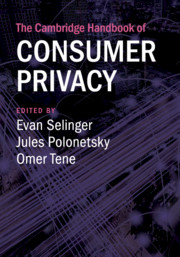10 results
Part V - New Approaches to Improve the Status Quo
-
- Book:
- The Cambridge Handbook of Consumer Privacy
- Published online:
- 18 April 2018
- Print publication:
- 02 April 2018, pp 353-354
-
- Chapter
- Export citation
Part I - Introduction
-
- Book:
- The Cambridge Handbook of Consumer Privacy
- Published online:
- 18 April 2018
- Print publication:
- 02 April 2018, pp 1-22
-
- Chapter
- Export citation
Copyright page
-
- Book:
- The Cambridge Handbook of Consumer Privacy
- Published online:
- 18 April 2018
- Print publication:
- 02 April 2018, pp iv-iv
-
- Chapter
- Export citation
Contents
-
- Book:
- The Cambridge Handbook of Consumer Privacy
- Published online:
- 18 April 2018
- Print publication:
- 02 April 2018, pp v-viii
-
- Chapter
- Export citation
Part III - Ethical and Legal Reservations about Tracking Technologies
-
- Book:
- The Cambridge Handbook of Consumer Privacy
- Published online:
- 18 April 2018
- Print publication:
- 02 April 2018, pp 149-282
-
- Chapter
- Export citation
Part II - The Pervasiveness and Value of Tracking Technologies
-
- Book:
- The Cambridge Handbook of Consumer Privacy
- Published online:
- 18 April 2018
- Print publication:
- 02 April 2018, pp 23-148
-
- Chapter
- Export citation
Contributors
-
- Book:
- The Cambridge Handbook of Consumer Privacy
- Published online:
- 18 April 2018
- Print publication:
- 02 April 2018, pp ix-xii
-
- Chapter
- Export citation

The Cambridge Handbook of Consumer Privacy
-
- Published online:
- 18 April 2018
- Print publication:
- 02 April 2018
Part IV - International Perspectives
-
- Book:
- The Cambridge Handbook of Consumer Privacy
- Published online:
- 18 April 2018
- Print publication:
- 02 April 2018, pp 283-352
-
- Chapter
- Export citation
1 - Consumer Privacy and the Future of Society
- from Part I - Introduction
-
-
- Book:
- The Cambridge Handbook of Consumer Privacy
- Published online:
- 18 April 2018
- Print publication:
- 02 April 2018, pp 3-22
-
- Chapter
- Export citation



